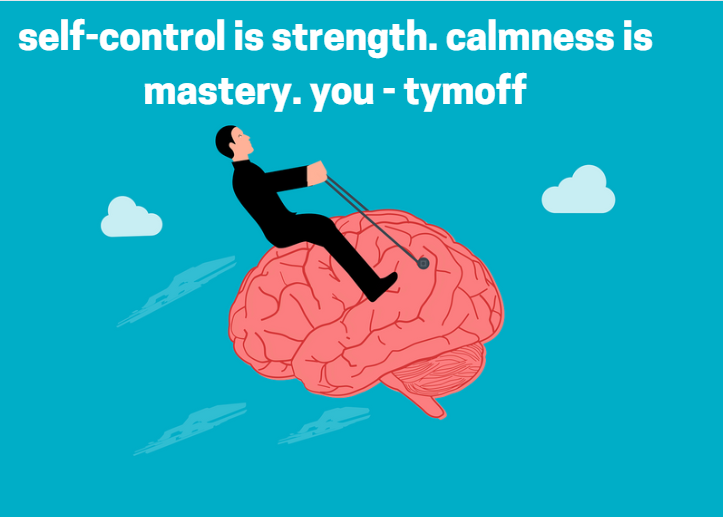Self-Control is Strength. Calmness is Mastery. You – Tymoff: A Comprehensive Guide
Contents
- 1 Introduction
- 2 Understanding the Philosophy
- 3 The Benefits of Self-Control and Calmness
- 4 Practical Strategies for Developing Self-Control and Calmness
- 5 Case Studies and Examples
- 6 FAQs about Self-Control and Calmness
- 7 Conclusion
Introduction
The phrase “Self-control is strength. Calmness is mastery. You – Tymoff” encapsulates a profound philosophy that emphasizes the importance of inner peace and self-discipline in achieving personal and professional success. In a world where external pressures and distractions are constant, developing self-control and maintaining calmness are essential skills.
This article delves deep into the meaning of this phrase, exploring its implications, benefits, and practical applications. By optimizing this content for the keyword “self-control is strength. calmness is mastery. you – tymoff,” we aim to provide a resource that ranks highly in search engine results and offers unique insights that surpass existing online sources.
Understanding the Philosophy
Self-Control is Strength
Definition and Importance
Self-control is the ability to regulate one’s emotions, thoughts, and behaviors in the face of temptations and impulses. It is a critical component of emotional intelligence and is linked to various positive outcomes, including better mental health, academic success, and interpersonal relationships.
The Power of Self-Control
Self-control allows individuals to make deliberate choices rather than reacting impulsively. It provides the strength to resist short-term gratifications in favor of long-term goals, fostering resilience and determination.
Historical Perspectives
Throughout history, philosophers and spiritual leaders have emphasized the importance of self-control. From the Stoics of ancient Greece to modern psychologists, the consensus is clear: self-control is a cornerstone of a well-lived life.
Calmness is Mastery
Definition and Importance
Calmness refers to a state of mental and emotional stability, where an individual can maintain composure and clarity of thought even in challenging situations. It is the mastery of one’s inner world, leading to better decision-making and problem-solving abilities.
The Power of Calmness
Calmness enables individuals to approach situations with a clear mind, reducing stress and anxiety. It fosters a sense of inner peace, which is crucial for maintaining overall well-being and achieving mastery in various aspects of life.
Historical Perspectives
Calmness has been valued across cultures and eras. From the teachings of Buddhism, which emphasize mindfulness and tranquility, to modern stress management techniques, the ability to stay calm under pressure is universally recognized as a key to mastery.
You – Tymoff: The Personal Connection
Individual Responsibility
The phrase “You – Tymoff” underscores the personal responsibility each individual has in cultivating self-control and calmness. It is a reminder that the power to achieve these states lies within oneself.
The Tymoff Perspective
Tymoff’s emphasis on self-control and calmness reflects a holistic approach to personal development. It encourages individuals to take ownership of their actions and emotions, leading to a more empowered and fulfilling life.
The Benefits of Self-Control and Calmness
Improved Mental Health
Reduced Stress and Anxiety
Practicing self-control and maintaining calmness can significantly reduce stress and anxiety levels. These qualities help individuals navigate life’s challenges with a balanced perspective, promoting mental well-being.
Enhanced Emotional Regulation
Self-control and calmness contribute to better emotional regulation, allowing individuals to manage their feelings effectively. This leads to improved relationships and a more positive outlook on life.
Greater Success in Personal and Professional Life
Achievement of Long-Term Goals
Self-control is essential for setting and achieving long-term goals. It provides the discipline needed to stay focused and motivated, even in the face of obstacles.
Effective Decision-Making
Calmness allows for clear and rational decision-making. By maintaining composure, individuals can assess situations objectively and make informed choices.
Enhanced Interpersonal Relationships
Improved Communication
Self-control and calmness contribute to more effective communication. They enable individuals to listen actively and respond thoughtfully, fostering better understanding and cooperation.
Conflict Resolution
These qualities also play a crucial role in conflict resolution. By staying calm and exercising self-control, individuals can navigate disagreements constructively, leading to positive outcomes.
Practical Strategies for Developing Self-Control and Calmness
Mindfulness and Meditation
Mindfulness Practices
Mindfulness involves paying attention to the present moment without judgment. Regular mindfulness practices can enhance self-awareness and emotional regulation, promoting self-control and calmness.
Meditation Techniques
Meditation is a powerful tool for cultivating calmness. Techniques such as focused attention, deep breathing, and guided visualization can help individuals achieve a state of mental and emotional stability.
Cognitive Behavioral Techniques
Identifying Triggers
Understanding the triggers that lead to impulsive behavior or emotional instability is the first step in developing self-control. Cognitive behavioral techniques can help individuals identify and address these triggers effectively.
Reframing Thoughts
Reframing involves changing the way one thinks about a situation to alter its emotional impact. By adopting a more positive or neutral perspective, individuals can maintain calmness and self-control.
Physical Exercise and Healthy Lifestyle
Exercise for Stress Relief
Regular physical exercise is known to reduce stress and improve mood. It provides a healthy outlet for releasing tension and promotes overall well-being.
Healthy Habits
Maintaining a healthy lifestyle, including a balanced diet, adequate sleep, and regular relaxation, supports mental and emotional stability. These habits contribute to the development of self-control and calmness.
Time Management and Goal Setting
Prioritizing Tasks
Effective time management involves prioritizing tasks and setting realistic goals. This helps individuals stay focused and reduces the likelihood of feeling overwhelmed.
Setting SMART Goals
SMART goals (Specific, Measurable, Achievable, Relevant, Time-bound) provide a clear framework for achieving objectives. They help individuals maintain self-discipline and stay motivated.
Case Studies and Examples
Historical Figures
Mahatma Gandhi
Mahatma Gandhi exemplified self-control and calmness in his leadership of the Indian independence movement. His non-violent approach and steadfast commitment to his principles inspired millions.
Nelson Mandela
Nelson Mandela’s ability to remain calm and composed during his 27 years of imprisonment is a testament to the power of self-control. His leadership and resilience were pivotal in ending apartheid in South Africa.
Modern Examples
Elite Athletes
Elite athletes, such as Serena Williams and LeBron James, demonstrate self-control and calmness in their sports. Their ability to stay focused under pressure contributes to their success and longevity in their careers.
Business Leaders
Successful business leaders, like Warren Buffett and Satya Nadella, emphasize the importance of emotional intelligence, which includes self-control and calmness. Their leadership styles reflect the benefits of these qualities in achieving professional success.
FAQs about Self-Control and Calmness
1. Why is self-control important?
Self-control is important because it allows individuals to regulate their emotions, thoughts, and behaviors. It enables them to make deliberate choices and resist short-term temptations in favor of long-term goals, leading to better mental health, relationships, and success.
2. How can I develop calmness?
Calmness can be developed through mindfulness practices, meditation, and cognitive behavioral techniques. Physical exercise, a healthy lifestyle, and effective time management also contribute to maintaining composure and emotional stability.
3. What are the benefits of self-control and calmness?
The benefits of self-control and calmness include improved mental health, better emotional regulation, greater success in personal and professional life, and enhanced interpersonal relationships. These qualities help individuals navigate challenges with a balanced perspective.
4. Can anyone develop self-control and calmness?
Yes, anyone can develop self-control and calmness with practice and dedication. It requires self-awareness, commitment to personal growth, and the adoption of effective strategies such as mindfulness, cognitive behavioral techniques, and healthy lifestyle habits.
5. How do self-control and calmness contribute to leadership?
Self-control and calmness are essential qualities for effective leadership. They enable leaders to make rational decisions, manage stress, and communicate effectively. These qualities also inspire trust and respect among team members, leading to better collaboration and outcomes.
Conclusion
The philosophy encapsulated in the phrase “Self-control is strength. Calmness is mastery. You – Tymoff” offers valuable insights into the importance of inner peace and self-discipline. By understanding and embracing these qualities, individuals can achieve personal and professional success, improve their mental health, and enhance their relationships.
This comprehensive guide has provided an in-depth exploration of the meaning, benefits, and practical strategies for developing self-control and calmness. By leveraging these insights, readers can take meaningful steps toward a more empowered and fulfilling life.

